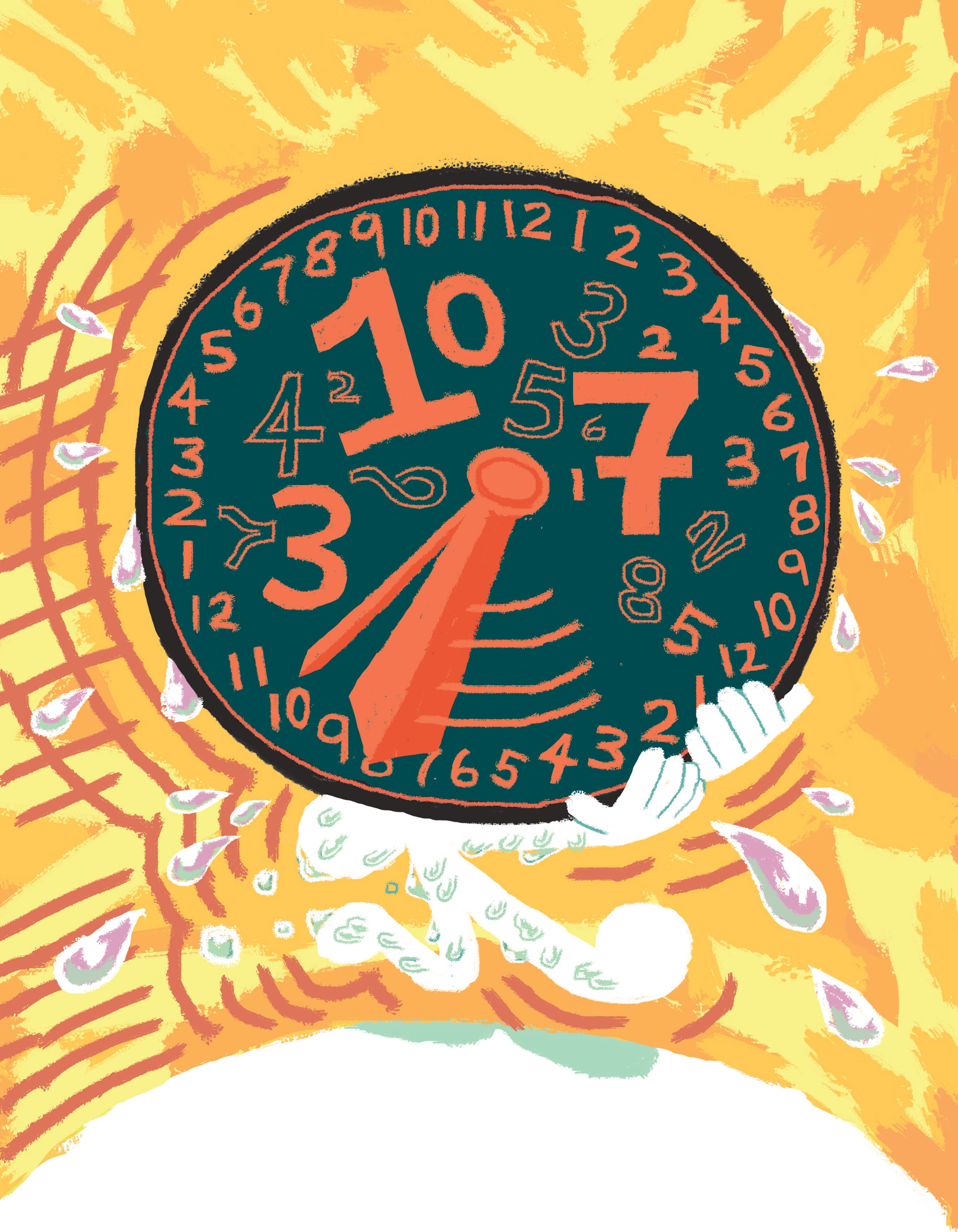
Growing up, I witnessed the hard work ethic of my dad, a chemical engineer who became an entrepreneur. He worked six, sometimes seven, days a week. I remember pleading with him to hang out with me on his days off. As you might guess, it didn’t happen very often. He was usually too tired to do anything. However, when we did hang out, those were some of the best moments of my life. I remember watching "King Kong" at a theme park — terrified, but loving the excuse to cling tightly to my dad.
I often tagged along with him to his work on weekends and wandered around in the chemistry lab. I learned at an early age that I shouldn’t put any white powdered chemical in my mouth thinking that it would be sugar or splash liquid chemicals for fun. Instead, I learned how to pipet with precision and how litmus papers worked, which were really cool discoveries for me.
Though our family appreciated his hard work, I sometimes wished that he were around more. I wished that he would not be so tired all the time, so we could go to theme parks on weekends, or that he would have time to sit down and talk to us. His company needed his commitment and entrepreneurial spirit, but our family also needed a father who was available and took better care of himself.
During my fourth year at the University of California, Riverside, as a chemical engineering major, I started working as a volunteer for the college group at my church in Anaheim. The college group could have been a church of its own with over 200 in weekly attendance, so a lot was required from the staff — from planning big events to the details of Friday and Sunday services. We had a lot of rallies, retreats, and meetings. Every Sunday was an 18-hour work day for our college pastor. For many of the other leaders, including myself, Sunday was a 12-hour work day. We often stayed at church until midnight, discussing and planning future events. That was what was expected of us. We were young and energetic, so we pulled it off.
When I felt a sense of calling to ministry, I approached my pastor and asked him about what it was like to be a minister. After some sharing, he handed me a book written by a well-respected Korean pastor. The book was “helpful”. The author convinced me that ministry was serious business. His commitment to his church made it seem like the work we were doing wasn’t nearly enough. But at the same time, I had a hard time understanding his stance. The author was calling all ministers to suffer, to work hard, and to put in long hours. I knew the Gospel had to be preached, prayers had to be prayed, people had to be counseled, and classes had to be taught. Sundays would come and people would show up, so I needed to work hard. I agreed that ministers of the Gospel are supposed to take care of God’s flock and His Church at all cost. But I found it hard to accept that they should regard everything else as insignificant.
In the Korean church, I had seen many pastors taking their calling seriously, so I understood the cost that came with becoming a pastor. I also wanted to be in this long term and accomplish many goals — dropping dead in my early 50s wasn’t one of them. Nevertheless, this knowledge did not stop me from pursuing ministry. After careful consideration, I enrolled at Talbot School of Theology and started serving as a youth ministry intern. I had never thought about the importance of Sabbath until I went to seminary and became busy with ministry. Previously, I thought Sabbath meant Saturday for Jewish people and Sunday for us Christians. I thought it meant that we go to church and worship God — that was what “keeping it holy” meant to me.

Have you ever felt guilty about not getting adequate rest on the Sabbath? Probably not. I don’t think many of us feel guilty about violating the Sabbatical law. During my college and seminary years, I felt proud of myself for being able to juggle my school work and church schedule for weeks at a time. During my first two years of seminary, I worked a morning shift in Costa Mesa, and then I’d sit in the I-405 traffic for 45 minutes to get to my classes in La Mirada. As I drove, I was either eating my lunch or memorizing Greek vocabulary and paradigms. On Wednesdays and Fridays, I’d stay at church until 11 p.m. for prayer meetings and fellowships.
At times, I thought it was crazy, but that seemed to be the norm among many seminarians. I went on without properly taking care of my body and soul or maintaining my relationships with family and friends. I simply did not know how to take care of myself. Soon after that, I got tired and I burned out. And I began to resent certain aspects of ministry that kept me busy and frustrated.
When I was an intern, I was officially asked to work 10-15 hours a week to run the youth ministry. However, the real expectation was that I would work far beyond those hours. These hours did not account for prep time or meeting attendance. Meetings were not a youth group necessity, but still mandatory, and included many prayer meetings throughout the week — oh, how I don’t miss early morning prayer meetings! After preaching every Sunday and teaching every Friday, along with other duties like office hours and Saturday morning gatherings, I easily worked double the stated hours. I enjoyed doing the work of ministry, but had mixed feelings about it at times. When I got tired, I wanted a short break here and there.
However, I saw my own senior pastor taking only five days for vacation a year. One year, he left for Hawaii with his wife on a Monday and came back in time to preach for that week’s Sunday service. How could I dare to ask for time off? It didn’t seem right for me to ask for as much time off as my senior pastor, and besides, I was not entitled to any time off as long as I was an intern. I carried on this workload for the next two years while attending seminary full time. My weekends were booked with church functions, and my weekdays were filled with classes and homework assignments. I was tired all the time. When my seminary professor said that Korean pastors needed to sleep more, all the Korean American students in the class burst out laughing. I don’t remember if I laughed or not; I was probably too tired to laugh.
Sabbath simply means cessation. It implies a day of rest for people. The book of Exodus connects the Sabbath with the fact that God rested on the seventh day after six days of work. So we keep it holy by observing it and resting (Exodus 20:8, 35:2). The goal is to stop our everyday work in order to recharge and renew ourselves.
Why? Because we need it. So we can go another week with a full tank. While Exodus connects the Sabbath to the Creation account, Deuteronomy connects the Sabbath to their deliverance from slavery (Deut. 5:15). Thus every Sabbath, we rejoice in the fact that God is our Creator and Restorer. He also is our Rescuer, not our slave driver. Hence we recognize His involvement and sovereignty over our lives. We are not infinite beings with an unlimited amount of energy and focus. God created our bodies and minds so that we cannot go on forever without stopping. So, it is a good idea to observe the Sabbath.

After two and a half years of being both a student and an intern, I was burnt out and had to step out of ministry. I spent about a month overseas resting that summer, then came back and finished up school while working for my parents and at Costco as a seasonal employee. I still did a million things then — I didn’t know how to take a break. Now that I’m out of school and working only one full-time job, I have learned to find balance by reserving my Mondays, my weekly day off, for Sabbath.
Every Monday, I wake up and cook two strips of bacon and three eggs over-easy, and make a cup of pour over coffee. Then I hit the gym with my roommate who is also a pastor. Monday is our roommate gym-bonding day. Then I spend the rest of the day cooking, GTLing (gym, tan and laundry), and hanging out with friends in the evening. It has become a pattern that I feel comfortable with and which helps me feel recharged and ready for another week. Do I still struggle with keeping the Sabbath? Yes, at times when there are pressing matters. Sometimes it is a struggle not to bring work home. But I am learning and improving in my desire and ability to keep the Sabbath because I want to be in this for the long run.

